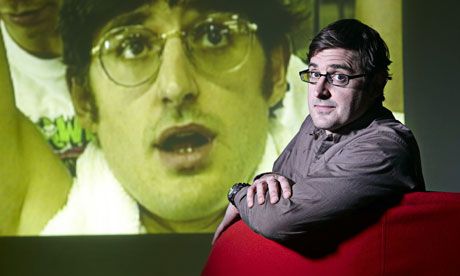C.K. Lawrence
Closed Account
How the internet killed porn
It's 15 years since Louis Theroux turned the TV cameras on to the US porn industry. Now he is revisiting it to see if anything has changed – and he finds a business in crisis

Louis Theroux: his new programme Twilight of the Porn Stars looks at the decline of the porn industry in America. Photograph: BBC
In a grand suburban house on a quiet cul-de-sac in California's San Fernando Valley an actor is having a problem with her moans. Aleksa Nicole (her professional name) is playing the role of a Latin beauty in A Love Story, a pornographic film about an author of romance novels suffering from writer's block. They are shooting a fantasy sequence in which Aleksa wanders the darkened corridors of the house in a white nightie, carrying a large candlestick. She stumbles into the arms of her forbidden lover, Miguel, played by rising star Xander Corvus, clad in leather trousers, frilly blouse and waistcoat. Helpless in the heat of passion, they make love on the chaise longue.
But there is a small issue. Aleksa's rapid high-pitched squeals of pleasure aren't up to the exacting standards of the film's director.
"Less porno," he says. By way of illustration he offers a different read – less urgent, more ladylike. "Yes, yes, yes!" Then he announces his keyword for the day: "Romantico!"
A Love Story is a new title by the high-end adult movie studio Wicked Picture. And for the world of "adult", the emphasis on the moans is a giveaway that it is not a typical sex film.
For years the porn industry was dominated by an anarchic anything-goes attitude to sex. Directors competed to see who could stage the more outrageous stunts, pushing the performers to the limit of what their bodies could take. The scenes could be hard to watch, as I discovered for myself when I visited sets for a book I was writing in 2004. The sex acts seemed to owe more to reality shows where people eat live worms and pig vomit than anything conventionally erotic.
But some time around 2007, the "business of X" started going into a commercial tailspin. The arrival of free YouTube-style porn sites meant that consumers could download pirated scenes from the vast backlog of old content for free. The phenomenon of DIY amateur sex – part-timers uploading their videos on sites such as clips4sale – also put a dent in the professionals' pay cheques.
Suddenly an industry that was a byword for easy money, raking in billions by exploiting the anonymity of point-and-click purchasing, was fighting for its life.
Making the problems of "adult" even worse was that where consumers might feel enough loyalty to, say, Radiohead to buy their latest release rather than download it illegally, porn users don't have the same feelings about the Dirty Debutantes series. In essence, as with every other media evolution of the last 30 years, from VHS to DVDs to the birth of the internet, porn was once again leading the way, only this time into obsolescence.
And as goes the industry, so go the performers. It's well known that many of them come into porn looking for validation, fleeing lives of damage and abuse. They then sign up to a lifestyle that inflicts stress and illness, not to mention embarrassment, on its young foot soldiers, while offering nothing in the way of pensions and health insurance. Now they find themselves out of work, looking for a Plan B, when the only experience on their resumé is having sex for cash.
On the business side, the porn industry has been desperately trying to adapt. Partly this has been a simple case of cutting back massively. In the early 2000s, a typical issue of the industry bible, the monthly Adult Video News, might have contained hundreds of reviews of new releases. One recent example had just 14. Numerous companies have gone out of business.
Those movie companies that remain are focusing increasingly on high-end product, trying to beat the illegal sites by providing something like a cinematic experience. There is a flight into "quality". In an uncanny echo of a recent BBC slogan, they are embracing the idea of "Fewer, Bigger, Better". For some, this means more female-orientated scenes with less angry sex. Hence A Love Story. For others, it means parodies – of popular TV shows and recent blockbusters.
One of the unlikeliest figures in the new reinvented industry – and a one-man indicator of how much it has changed – is Rob Zicari, better known as Rob Black. In the 90s, Black was one of the most notorious provocateurs in porn. He specialised in tastelessness; his films were more like grotesque exercises in taboo-breaking than anything anyone might conceivably watch for sexual pleasure.
In 1997 I interviewed him in his office in LA and visited him on the set of a production entitled Forced Entry, a film about rape. He was only 23 at the time and I was struck by the strange contrast of his being a friendly, intelligent guy – albeit in an over-caffeinated way – while making porn films that specialised in degrading women. Six years later, Black's provocations caught up with him during George Bush's "war on obscenity" (the war's two other casualties were Justin Timberlake and Janet Jackson, when she exposed her nipple in a dance routine during the Superbowl).
more at link: http://www.guardian.co.uk/culture/2012/jun/05/how-internet-killed-porn
Thoughts?
